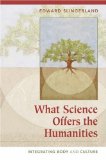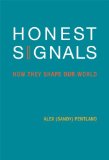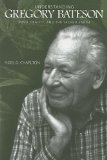October 16, 2008
“Arguing for Embodied Consciousness” at Deric Bownds’ Mindblog excerpts a review from Science of What Science Offers the Humanities: Integrating Body and Culture by Edward Slingerland . This book came up earlier in a review article on evolutionary psychology in The Walrus (Sept. 2008).
. This book came up earlier in a review article on evolutionary psychology in The Walrus (Sept. 2008).
Google Video has a talk by Slingerland from “Beyond Belief: Enlightenment 2.0” (Dec. 2007). Check out the “related videos” there for Daniel Dennett and other speakers.
Product description for the book:
Product Description
What Science Offers the Humanities examines some of the deep problems facing current approaches to the study of culture. It focuses especially on the excesses of postmodernism, but also acknowledges serious problems with postmodernism’s harshest critics. In short, Edward Slingerland argues that in order for the humanities to progress, its scholars need to take seriously contributions from the natural sciences-and particular research on human cognition-which demonstrate that any separation of the mind and the body is entirely untenable. The author provides suggestions for how humanists might begin to utilize these scientific discoveries without conceding that science has the last word on morality, religion, art, and literature. Calling into question such deeply entrenched dogmas as the “blank slate” theory of nature, strong social constructivism, and the ideal of disembodied reason, What Science Offers the Humanities replaces the human-sciences divide with a more integrated approach to the study of culture.
Comments (2)
- culture
September 18, 2008

Honest Signals: How They Shape Our World by Alex (Sandy) Pentland (MIT Press, 2008) recently appeared on the bookstore shelves.
Product Description
How can you know when someone is bluffing? Paying attention? Genuinely interested? The answer, writes Sandy Pentland in Honest Signals, is that subtle patterns in how we interact with other people reveal our attitudes toward them. These unconscious social signals are not just a back channel or a complement to our conscious language; they form a separate communication network. Biologically based “honest signaling,” evolved from ancient primate signaling mechanisms, offers an unmatched window into our intentions, goals, and values. If we understand this ancient channel of communication, Pentland claims, we can accurately predict the outcomes of situations ranging from job interviews to first dates.
Pentland, an MIT professor, has used a specially designed digital sensor worn like an ID badge—a “sociometer”—to monitor and analyze the back-and-forth patterns of signaling among groups of people. He and his researchers found that this second channel of communication, revolving not around words but around social relations, profoundly influences major decisions in our lives—even though we are largely unaware of it. Pentland presents the scientific background necessary for understanding this form of communication, applies it to examples of group behavior in real organizations, and shows how by “reading” our social networks we can become more successful at pitching an idea, getting a job, or closing a deal. Using this “network intelligence” theory of social signaling, Pentland describes how we can harness the intelligence of our social network to become better managers, workers, and communicators.
Visit the author’s website for more information.
Comments (1)
- culture,new books
September 13, 2008
“Everything is connected” at the Guardian gives a nice summary of Gregory Bateson’s thought, especially on the relationship between art and politics (though “everything is connected”).

Here’s an excerpt:
His thinking contained a kind of catch-22: the conscious mind, his own included, was of its nature incapable of grasping the vast system of which it was only a very small and far from representative part; hence any major intervention to “solve” a given problem would always be ill-informed and inadvisable. The only possible solution would be a radical change in our way of thinking, or even our way of knowing, a new (or ancient) mindset in which conscious purpose would be viewed as only a minor and rather suspect part of mental life.
Dreams, religious experience, art, love – these were the phenomena that still had power, Bateson thought, to undermine the rash/rational purposeful mind. Of these four, art enjoyed the special role of fusing different “levels of mind” together: there was necessarily consciousness and purpose in the decision to create, but creativity itself involved openness to material from the unconscious, otherwise the work would be merely schematic and transparent.
Gregory Bateson at Wikipedia
Gregory Bateson – books at Amazon

Steps to an Ecology of Mind
Comments (0)
- consciousness,culture
September 10, 2008

Outliers: The Story of Success by Malcolm Gladwell is scheduled for a Nov 18 release, but available for pre-order and the publisher Hachette Book Group has an excerpt available here, which appears to be the whole prologue.
Product Description
In this stunning new book, Malcolm Gladwell takes us on an intellectual journey through the world of “outliers”–the best and the brightest, the most famous and the most successful. He asks the question: what makes high-achievers different? His answer is that we pay too much attention to what successful people are like, and too little attention to where they are from: that is, their culture, their family, their generation, and the idiosyncratic experiences of their upbringing. Along the way he explains the secrets of software billionaires, what it takes to be a great soccer player, why Asians are good at math, and what made the Beatles the greatest rock band.
Brilliant and entertaining, OUTLIERS is a landmark work that will simultaneously delight and illuminate.
BuzzFeed has some more links on Outliers and Gladwell…
Comments (1)
- culture,new books
 . This book came up earlier in a review article on evolutionary psychology in The Walrus (Sept. 2008).
. This book came up earlier in a review article on evolutionary psychology in The Walrus (Sept. 2008).





